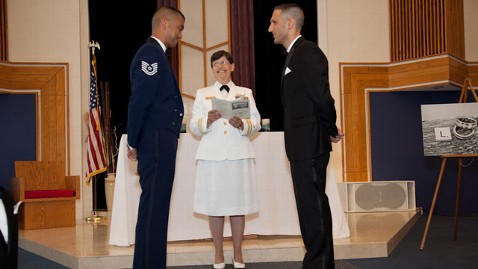Pentagon Extends More Benefits to Same Sex Partners

Courtesy of Jeff Sheng
A year and a half after the repeal of Don't Ask, Don't Tell the Pentagon is extending many benefits to the same sex partners of military service members that until now had only been available to heterosexual couples.
However, access to health care and some housing allowances available to spouses will remain unavailable because the Defense of Marriage Act defines a marriage as being between a man and a woman.
In a statement announcing the move, Defense Secretary Leon Panetta said, "It is a matter of fundamental equity that we provide similar benefits to all of those men and women in uniform who serve their country."
"The department already provides a group of benefits that are member-designated," he said. "Today, I am pleased to announce that after a thorough and deliberate review, the department will extend additional benefits to same-sex partners of service members."
At the time that the repeal of Don't Ask, Don't Tell was implemented in 2011, same sex partners became eligible for 20 member designated benefits. These included being listed as beneficiaries of the Service member Group Life Insurance policy, the death gratuity, and being allowed hospital visitation rights.
However, gay advocacy groups campaigned for a further extension of almost 100 additional benefits to same sex partners.
In a memo released today Panetta extended 22 new benefits to service members and military retirees with same sex partners. The additional benefits include the issuing of new military identification cards that will allow partners access to military commissaries, military exchanges and access to child care.
To be eligible for these benefits service members and their same sex partners will have to file a "declaration of domestic partnership." The form will enable same sex couples to gain access to the benefits in the 41 states where gay marriages is not legal.
An additional 85 benefits such as access to on-base housing and burial at Arlington National Cemetery not offered Monday even though they are not precluded by the Defense of Marriage Act. In his memo Panetta said making those changes "presents complex legal and policy challenges due to their nexus to statutorily-prohibited benefits and due to ongoing reviews about how best to provide scarce resources."
Later this year the Supreme Court is expected to rule on the constitutionality of the Defense of Marriage Act. In his memo Panetta said that if the court says the law is no longer applicable, then the Pentagon will be able to extend full military benefits to same sex couples.
Panetta's memo directs the military services to have a system in place to accept the benefits Aug. 31, and that no benefits be rolled out no later than October.
Senior defense officials who briefed reporters on the benefits extension said they would likely impact about 5,600 same-sex couples with an active-duty service member, 3,400 with the National Guard or Reserves, and 8,000 military retirees .
Gay advocacy groups praised the changes instituted by Panetta but still called for full benefits that could only be provided if the Defense of Marriage Act were to be repealed or ruled unconstitutional.
"We thank him for getting us a few steps closer to full equality - steps that will substantively improve the quality of life of gay and lesbian military families," said Allyson Robinson the Executive Director of OutServe-SLDN.
On Sunday, Army Chief Warrant Officer Charlie Morgan lost her battle with breast cancer. A full-time active duty member of the New Hampshire National Guard, Morgan campaigned against the Defense of Marriage Act and for the expansion of same sex benefits.
Asked about Morgan's case given her passing this weekend a defense official said the additional benefits announced Monday would not be retroactive.
However, Maj. Greg Heilshorn, a spokesman for the New Hampshire National Guard, said that if Morgan was not eligible for the extended benefits then "we would most likely ask for an exception of policy" that would grant those benefits to her spouse Karen and their 5-year-old daughter Casey.
Heilshorn also said that Morgan's spouse would be eligible for the death benefits provided under the member designated benefits.
"She has been a very strong voice for this cause," said Heilshorn and I know our leadership has been very proud of her and her willingness to put herself out therefor a greater cause. Something like this doesn't benefit just her and her family, but lots and lots of service members as well.